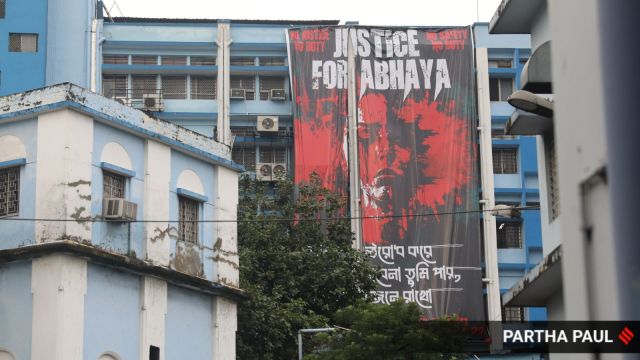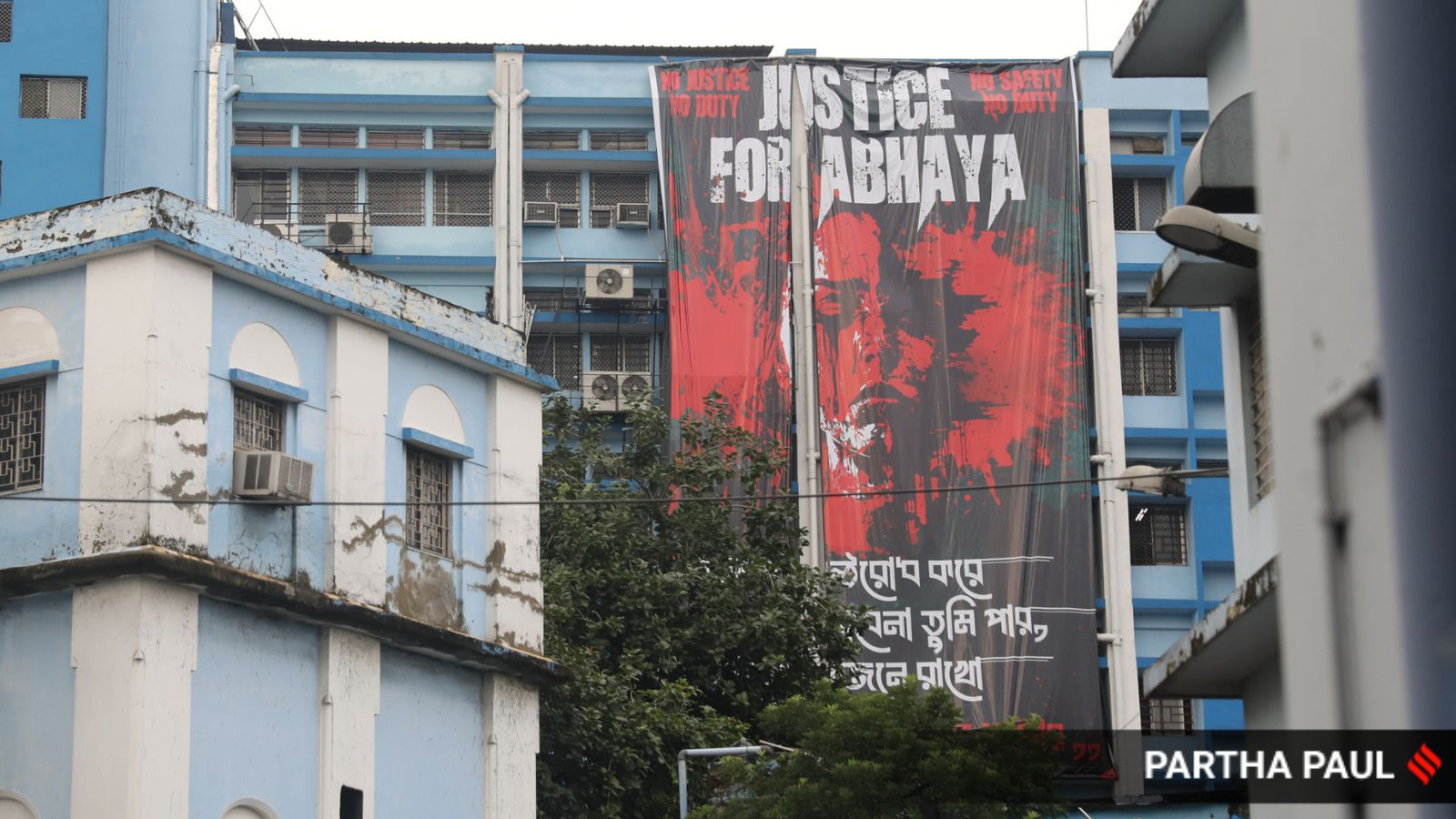
I grew up about a 15-minute walk from the R G Kar Medical College and Hospital in what was then Calcutta. I remember a couple of visits to its men’s hostel, where a school friend was studying to be a doctor, and even an overnight stay in rooms that seemed to be quite open to use and abuse by alumnae who wanted a bit of a home base in the city. I was too young to realise what a uniquely male privilege this was, to hang out in friends’ hostels and spend nights there. Just outside the hospital was a country liquor theka, a dark hall cloudy with drunken noise that evoked the careless nakedness of a life I’d never quite seen anywhere else. True to the reputation of government hospitals in Calcutta, there were oceans of people waiting and suffering at its gates, a few corpses sprouting in the process.
When I read about the horrifying violation and death of the medical trainee at this hospital last week, the grimy and crumbling walls of its corridors and washrooms came back to haunt me. In the past 25 years and counting, the rowdy squalor, the violence, the systemic failure and corruption that pervaded the place like smog has deepened from the CPI(M) to the TMC regime. I spoke to one of the R G Kar students I used to hang out with back then, now a reputed physician in the city. The infrastructure was just as shoddy and broken then, but there was a sense of trust and community among the students that, he said in deep dismay, had completely shattered these past few years under the current administration of the hospital.
Something soul-destroying about this deeply gendered violation and the death of an ambitious, highly educated young person at the start of an important career. No one would ever claim that the value of an educated professional life is higher than one which hasn’t received such empowerment. I mean quite the opposite. If an educated, ambitious woman meets such a fate during her professional duty, what does it even mean to be educated and professional in this world? And what does it mean for the vast majority who cannot even aspire to her position? What is even the meaning of that aspiration after this tragedy? Its symbolic life, at the very least, is now stained forever.
But it has been a dark year for ambitious and aspirational youth in India. Just about a month ago, three young people — two women and a man — drowned in a private coaching centre for UPSC examinations in Delhi’s Rajinder Nagar. They were aspirants for the Indian Administrative Service — the coveted position of power and prestige that draws hundreds of thousands of provincial youth to the concentration camps of coaching in Delhi. Education, with its unique promise of upward socioeconomic mobility, generates a mushroom cloud of anxiety across social classes in India, and there is no dearth of people vulturing on the vulnerable to turn fear and aspiration into profit. It has almost been a decade since the IIT-Bombay alumnus, Alankar Jain, wrote about his suicidally depressing days in a dark and clammy room in Rajasthan’s Kota, the national capital of private coaching for engineering entrance tests — and the spine-chilling graffiti he met on its walls, carved by a previous occupant: “I spent my worst years in this room. It’s your turn now.”
Claustrophobia turned real for these IAS aspirants when the water flooded the basement library of their coaching centre. As one survivor told the Times of India, despite charging a fee of 2 lakhs rupees, the coaching centres had no safety standards in spaces where the youth studied and spent time. Poor drainage, and even electrocution deaths were common in these streets, and Delhi’s unexpected monsoon momentum did the rest.
I can’t imagine that it feels very cheery to be an educated, ambitious, young person in India right now. And herein lies a frightening irony. With ageing populations all across the post-industrial global north — even with a now-stalled population growth in China — the population dividend has been one of India’s unique strengths, be it in the size and independence of the domestic market or the momentum of its educated workforce. As someone with a global career in higher education who’s been involved in the young life of a new Indian institution of higher education, I’ve witnessed this tremendous educational energy first-hand — as well as the aspirations and anxieties around it. But looking beyond the confines of a private institution of liberal education, the news from the wider sphere of state education and competitive exams for government positions has rippled with shocks that have reminded us that we have not fixed any of our old problems. Unchecked, they have caused greater havoc on lives. The claustrophobia of mental health has turned into death by water and violence. Is this the system and the atmosphere that we have ready for our future doctors, engineers, and civil servants? Or, to leave a rubble of bodies is the inescapable fate of education and competition in India?
At a time when the mental health crisis among college-going students is a pandemic, the system of health education revealed its terrifying crack in the fiasco over the question leaks in the NEET examinations — the National Eligibility cum Entrance Test for entrance to medical degree programmes — still a poorly resolved controversy. It was an inevitable meeting of ill-fated forces — the sheer desperation for a seat, greed and corruption in local administration, and a giant, creaky, unstable system perpetually waiting for disaster.
Cliches are true. In a country of the magnitude and diversity of India, polar opposites don’t nullify each other. Higher education and professional training are beacons of hope for millions of young Indians. Netflix shows around aspirants bear testimony to that as much as the endless queues for admissions to college and professional programmes. But what is the safety around these queues? What is the safety even after you’ve made it to the training? The horrifying immediacy of the R G Kar murder should not distract us from the vast and chilling network of medical corruption to which it points. If we cannot ensure safe spaces around our student aspirants and young professionals — if a trainee doctor cannot catch her rest between her duty hours without the fear of being violated and murdered — what is it exactly that higher education and training brings for people? What should have been an obvious answer now lies stained.
The writer is professor of English and Creative Writing at Ashoka University. Views are personal



